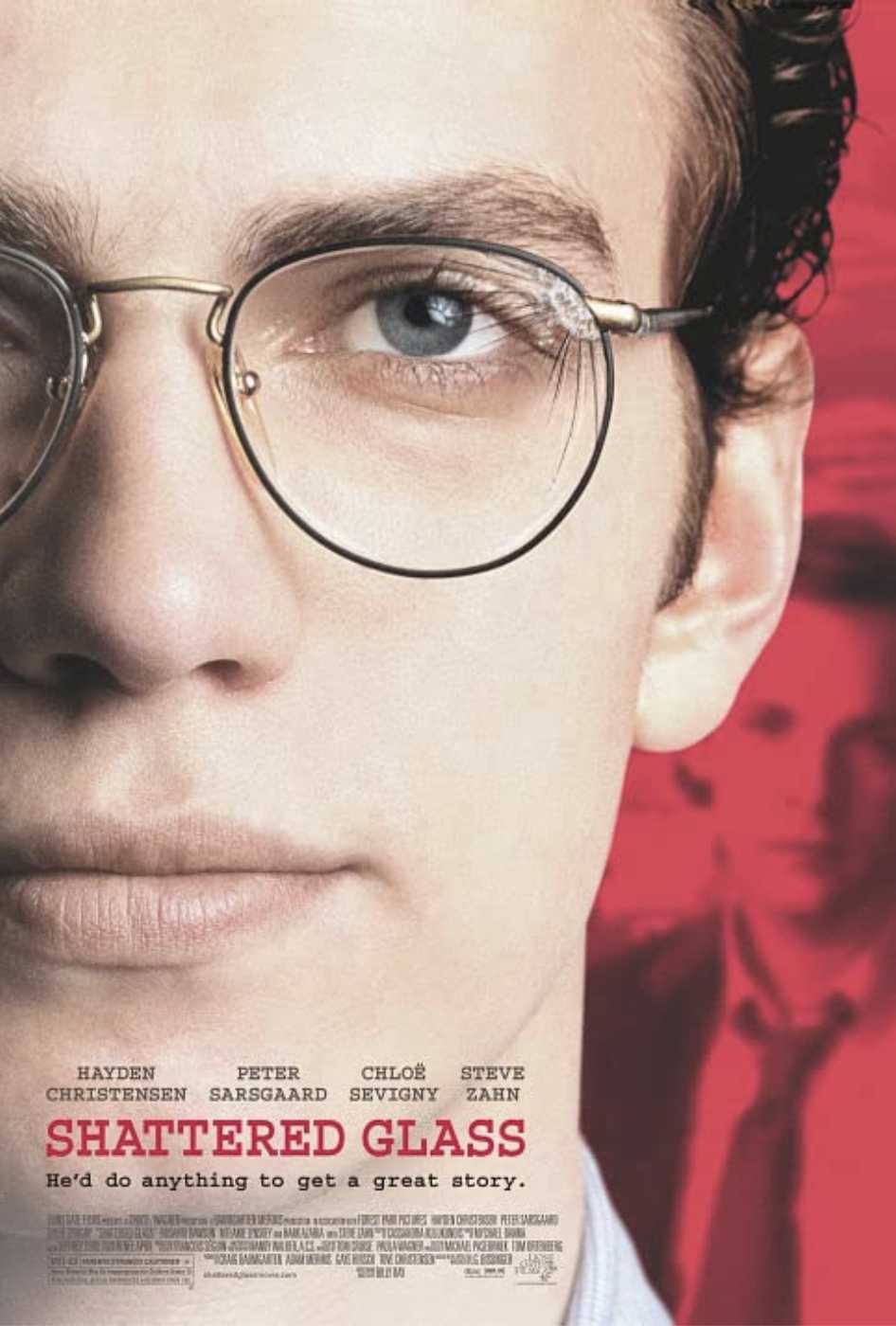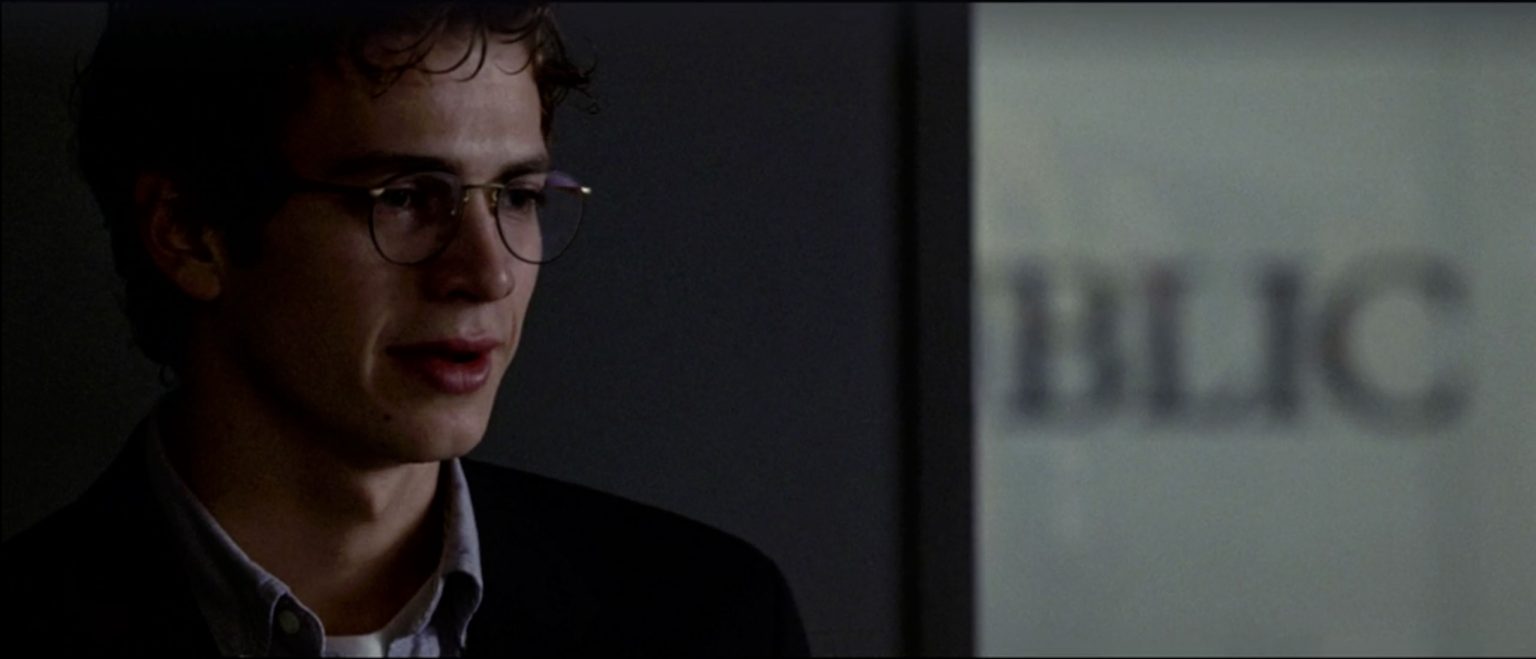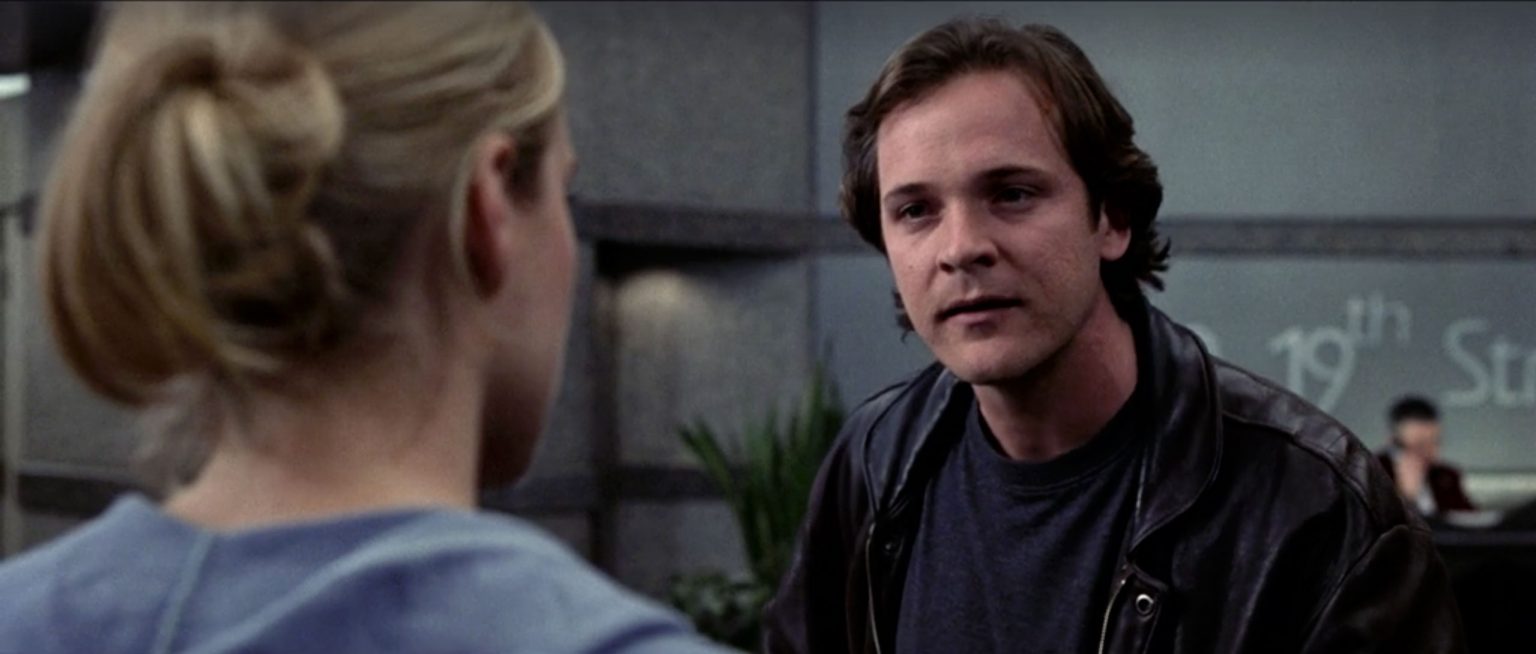Starring: Hayden Christensen, Peter Sarsgaard, Steve Zahn, Chloë Sevigny, Rosario Dawson, Melanie Lynskey and Hank Azaria
Written by: Billy Ray
Based on an Article by: Buzz Bissinger
Directed by: Billy Ray
Rated: PG-13
Running Time: 1hr 34mins
WINNER – National Society of Film Critics Awards – Best Supporting Actor (Peter Sarsgaard)
WINNER – San Francisco Film Critics Circle – SFFCC Award – Best Supporting Actor (Peter Sarsgaard)
NOMINEE – Film Independent Spirit Award – Best Feature, Best Screenplay (Billy Ray), Best Supporting Male (Peter Sarsgaard) and Best Cinematography (Mandy Walker)
In the 1998 “Vanity Fair” article that inspired the film, Buzz Bissinger wrote that Stephen Glass “established himself as the Darth Vader of Detail” as a fact checker. Hayden Christensen made this film between the two Star Wars films in which he portrays Anakin Skywalker/Darth Vader. – IMDB
Fun Fact: The actor who portrays the owner of The New Republic is Ted Kotcheff – Director of FIRST BLOOD.

“It all worked because of his (Stephen Glass) skill at creating incredibly complex scenes and also because of that accommodating personality. Glass was the guy always ready to lend a sympathetic ear to colleagues going through divorces or trying to juggle kids and careers. He was almost brutally self-flagellating about his own work and abilities—so much so that his co-workers felt protective.”
From the Vanity Fair article that inspired the film
Upon its release, director Billy Ray’s film SHATTERED GLASS received a fair share of praise from movie critics across the country and as of this article’s publication, it has a 92% fresh rating on the Rotten Tomatoes website. Still, it made very little money at the box office when it was released in theaters and remains mostly unseen. The choice of actor to portray the lead may have been a big part of the reason for the moviegoing audience’s lack of interest. This actor had recently presented a much-criticized and wooden performance in the highly anticipated STAR WARS film EPISODE II: THE CLONE WARS. It was the kind of performance that could kill a career and make people think that the performer had no acting abilities. Too bad SHATTERED GLASS didn’t come out first. The actor, this time out, gives a powerful performance as journalist Stephen Glass and it’s the kind of performance that could’ve actually made his career if only more people had ignored the earlier film and paid more attention to the latter. This actor was Hayden Christensen.
Based on the true story reported on in a Vanity Fair article by Buzz Bassinger, SHATTERED GLASS tells the story of a 26-year-old journalist, Stephen Glass, as his life is turned upside down. Glass was a rising talent who wrote for The New Republic magazine, a publication read by a lot of very important people and known as the inflight magazine of Air Force One. As Glass puts it, “…what you write gets read by people who matter. Presidents. Lawmakers. Your work can actually influence Public Policy.” Then, after writing an article called Hacked Heaven, the validity of his stories is called into question. Another reporter, Forbes Digital Tool writer Adam Penenberg (Steve Zahn), is questioned by his editor about why he didn’t get the story and unaware of anything regarding the report, Penenberg begins to check into it only to find that he cannot verify any of Glass’s sources.

Screenwriter/Director Billy Ray, best known for writing films like CAPTIAN PHILLIPS and THE HUNGER GAMES, made his directorial debut with SHATTERED GLASS and took a relatively smart approach to the story. The script is not a mystery, keeping viewers guessing as things get revealed. It doesn’t hide whether Glass is guilty or not. After all, it’s based on a true story and there’s a good chance that the viewers already know the outcome. Ray is more interested in the inner workings of Glass’s emotional state as he is forced to deal with his wrongdoings being revealed and the only way the viewer can truly understand this is for them to know where he stands. The film becomes more of an examination of the inner workings of a liar and how desperate the search for answers can become, both false from the person being accused and truthful by those who uncover the real answers. The script is about how the truth can either set us free or bring us down, depending on which side of it we are on. By letting the viewer know right from the moment the investigation begins, and maybe even a few scenes before, the script allows the viewer a way to understand and become more invested in Glass’s undoing. As Penenberg digs deeper and The New Republic’s Chief editor Chuck Lane (Peter Sarsgaard) starts to question things more, it’s Glass’s desperation that is so interesting. He struggles to maintain his innocence. We see how well he’s planned everything – taking fake notes, garnering trust by catering to everyone around him, showing a pretend lack of faith in his own stories as he states, “I probably won’t even print it.” and looking pathetic as he continuously asks, “Did I do something wrong?” or “Are you mad at me?”
Christensen shines as a young Stephen Glass. Behind his circular glasses, he exudes a real innocence in both how he looks and carries himself. It’s easy to see how everyone could succumb to Glass’s charming ways. Even as we discover the details of what is going on, Christensen gives Glass such an innocent quality that we start to feel sorry for him, almost as if he’s the victim. We want to believe him when he starts to act as if his sources have duped him, but we just can’t. Although we are never given a reason for what he has done, there are hints of a certain pressure for him to succeed. What Glass does doesn’t seem to be a result of his being bad, but maybe being a little desperate. Watching him try to manipulate his way out of a phone call with Lane and Penenberg is intense, and when he is brought to the supposed locations of one of his stories and he ultimately realizes that he has been caught, you can see the gears running in his head as he desperately tries to come up with answers. Of course, after all is said and done, it’s the viewer who will have to ask if all the desperation that Glass exudes is real or if he’s just playing a part to gain sympathy.

Peter Sarsgaard, who plays editor Chuck Lane is the film’s real star giving a performance that garnered numerous awards and nominations. Lane not only has to struggle with the truths being revealed but also must deal with everyone who stands up for Glass. The New Republic is a respected magazine known for delivering the truth; a scandal like this could take it down. It’s Lane that has to decide what to do to make things right. With Lane, the writing takes an interesting turn when at a certain point Glass transforms from Protagonist to Antagonist and Lane becomes the main focus. He has his own story to tell. Because he has been brought on to replace another editor everyone loved, he has a mountain to climb to gain everyone’s trust and going after a young reporter doesn’t help. As the story moves forward, he begins to grow as a character and his inner struggles become front and center. Saarsgard effectively shows us some real humanity in Lane as he tries to uncover the truth while also realizing that Glass is only a young kid whose whole career can be destroyed. What’s so strong in the performance is the subtle looks we get from Lane as he slowly begins to question the answers Glass gives and grows to realize the truth of the situation.
The supporting cast is as strong as they come. From Hank Azaria, who plays the magazine’s initial editor who now questions whether Glass ever presented him with any fabricated stories, to Melanie Lynskey as a fellow reporter, who is both friend to Stephen and envious of his success. Steve Zahn is excellent as the Forbes Digital Tool reporter who seems to be enjoying the process of bringing this story to light. The standout, though, is Chloë Sevigny as fellow reporter Kaitlin Avey. She is very strong-willed and protective of Glass. It’s Sevigny, along with Sarsgaard, who have the best scene in the film as Lane finally gets to speak the truth of his feelings while Avey is confronted with the reality of the situation and the true reasons behind her loyalty to Glass.
SHATTERED GLASS is going to surprise a lot of people. Hayden Christensen is also going to surprise a lot of people. In real life, it was revealed that 27 of Glass’s articles were completely fabricated. Writer/Director Billy Ray has given us a well-thought-out film with all the right pieces set into place. There is even a very effective moment where the process of fact-checking articles is explained, which adds to the reality of how Glass could pull off what he did. An interesting movie that thrives on its emotional performances, this is one not to be missed.
Watch SHATTERED GLASS
You May Also Like
